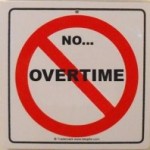By Jim Cline and Troy Thornton

In Village of Skokie, 2020 BNA LA 1311, Arbitrator Sinclair Kossoff found that the employer did not violate the CBA when it denied an Officer’s bereavement pay request. The Union argued that vacation should be converted to bereavement leave when applicable. But the Arbitrator concluded that the Union position was not supported by CBA language.
[Read more…]










